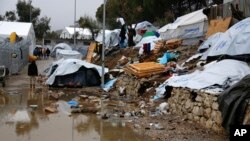Greek authorities said Thursday that about 74,000 asylum-seekers are now living in the country, and efforts are under way to expand housing for them and improve conditions at island camps for migrants who arrive by sea.
Migration Minister Dimitris Vitsas said that in coming months some 6,000 people will be moved to the mainland from island camps, where conditions have repeatedly been criticized by rights groups.
Vitsas conceded that the situation is "difficult" in these camps, where 20,000 people live in facilities designed for fewer than 10,000.
He promised to set up small health centers in each of the camps on the islands of Lesbos, Samos, Chios, Leros and Kos — where, under a deal between the European Union and Turkey to curb migration flows, new arrivals by sea from Turkey are kept pending processing of their asylum bids.
Vitsas said a sewage treatment plant was expected to be completed by March 2019 at the Moria camp on Lesbos that was built for 3,100 but currently is hosting 7,084 people. He blamed the delay on "devilish bureaucracy."
Conditions on Moria in particular have been repeatedly and heavily deplored by residents and human rights groups, while one visit by health inspectors noted that raw sewage was trickling out of the main entrance to the camp.
An overcrowded camp on Samos will be replaced by a new one with double the capacity, Vitsas said during a press conference in Athens.
This year, some 42,000 migrants have entered Greece illegally — 14,000 crossing the country's land borders, mostly from Turkey. Vitsas said that he doesn't expect an increase in flows next year, but in any case authorities would be in a position to handle up to 20 percent more arrivals.
He added that the number of migrants leaving Greece illegally for other European countries is minimal.




